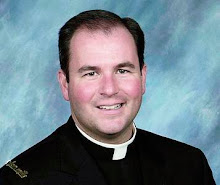With Lent approaching, which is a penitential season, I think we need to talk briefly about mortal sin, what it is, what we can do about it, and how to avoid it.
Mortal sin destroys charity in your heart. It turns you away from God, and only through the Sacrament of Confession can we be reconciled to God. An act of mortal sin has grave matter associated with it. For example, abortion is grave matter, so anyone performing an abortion, or a mother having an abortion, has grave matter. The first criteria for a mortal sin is whether it is grave matter. There is also light matter, which are associated with venial sins. Venial sins distort our charity, but it doesn't destroy it, nor does it destroy our relationship with God. Venial sins, however, make us more disposed to commit mortal sin. An example of this is talking back to your parents by telling them you won't do something they asked you to do. That is light matter, and so it is venial. But with repititions and frequently talking back to your parents, it will make you more disposed to commit an act with grave matter, say, telling your parents that you hated them, or using the Lord's name in vain while arguing with them.
So the first criterion of a mortal sin is that it is an act with grave matter. The second criterion is that you must be aware that you are doing it, and that you did it intentionally. Intention to commit the act in question also plays a part in weighing over whether the act is constituted a mortal sin. In the example of accidently having a car accident and killing someone else, you did not have the intention of having the car accident to kill the other person, so the act of killing someone, although it is still grave matter, isn't a mortal sin because the intention isn't there.
The third criterion for a mortal sin is whether you have had sufficient reflection of the act. If you know from the past that it is an act of grave matter, then you know that it might be a mortal sin. For example, if someone out there didn't know that abortion was grave matter, then for him or her, it wouldn't be a mortal sin. But for someone who did know, it would be considered a mortal sin. It is important to note, that the gravity of the act is not dependent on the person and their knowledge of what is good. Abortion is intrinsically wrong in every single circumstance, and the gravity of abortion stays the same. But it depends on the person and their knowledge or ignorance whether they committed a mortal sin. I hope this makes sense. In short, abortion is always grave matter, but if the person honestly didn't know (which I find hard to believe with abortion, because the nature of life should be innate in every person), then it wasn't a mortal sin for them.
In short, a mortal sin has those three criteria: grave matter, intention of doing it, and sufficient reflection that the act was of grave matter. If it has all three of these criteria, then it is a mortal sin. If not, then it is probably a venial sin.
When, after having committed a mortal sin, a person who is penitent should seek a priest for the Sacrament of Reconciliation. Reconciliation restores the charity in our heart and restores us back to the friendship of God that every person, at least implicitly, longs for.
And how do we avoid it? The number one thing someone can do to avoid mortal sin is by going to Reconciliation frequently for the venial sins one commits, because, as I stated earlier, venial sins make one more disposed to commit a mortal sin. By frequenting the Sacrament of Reconciliation and by going to Mass regularly (not going to Mass on Sunday can be a mortal sin if it meets the three criteria), they can be great tools to avoid the near occasion of mortal sins. Additional prayer is also important. Try praying a Rosary with the intention of avoiding the near occasion of sin.
May you remain close to the Sacred Heart of Jesus through the Immaculate Heart of Mary.







No comments:
Post a Comment